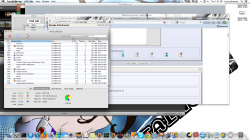when i use lion, (8Gb of ram) i regularly have to free memory myself. if i do not, then inactive memory builds, pageouts build, virtual memory increases, all while 'free memory' dwindles down to less than 100mb, the system will not think to free memory, it only free's memory when i quit the whole application. (closing tabs/windows, etc does not seem to free it)
this is a terrible experience on normal hdd's, has anyone noticed a difference on mountain lion , particularly people not using ssd drives?
pleas, this is very important for me, as i'v been considering reverting to windows
this is a terrible experience on normal hdd's, has anyone noticed a difference on mountain lion , particularly people not using ssd drives?
pleas, this is very important for me, as i'v been considering reverting to windows


